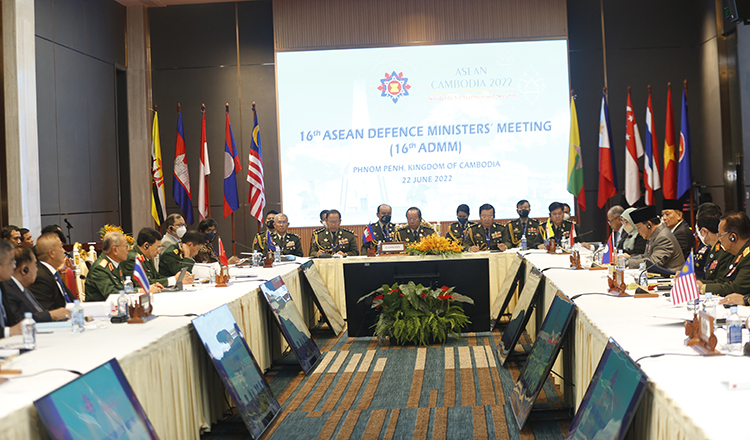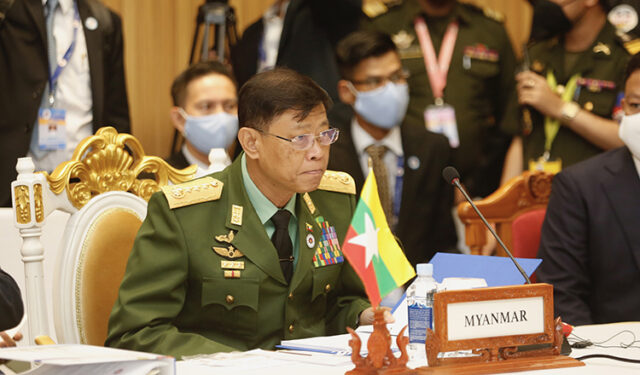Thorny issue: Myanmar’s transition to normalcy key topic at ADMM

ASEAN Defence Ministers yesterday emphasised the need for efforts to bring about a peaceful transition to normalcy for Myanmar at their regional meeting yesterday amid the controversial attendance of the Junta’s Defence Minister General Mya Tun Oo.
The 16th ASEAN Defense Ministers’ Meeting (16th ADMM) and related meetings hosted by Cambodia kicked off in Phnom Penh and were chaired by Defence Minister General Tea Banh.
In his opening remarks, Gen Banh called on Asean to stay united to maintain its strength and resilience while the whole region is confronting the pressures of increasing geopolitical competition, transnational crime, terrorism, security and technological challenges, climate change, disasters, and epidemics.
“Implementing this commitment will help us move forward together towards peace, security and sustainable prosperity,” he said.
On the Myanmar issues, Gen Banh said they are a challenge that “undermines the unity and cohesion” of Asean and need to be addressed.
“The current priority is to accelerate the implementation of the ASEAN Five-Point Consensus,” he said. “All parties concerned must be willing to effectively implement the agreements already reached to help bring Myanmar and its people back to normalcy, as well as to strengthen Asean unity and solidarity.”
In a joint declaration on “Defence Cooperation to Strengthen Solidarity for a Harmonised Security”, the ASEAN Defence Ministers also emphasised the bloc’s efforts to bring about a peaceful transition to normalcy in Myanmar through supporting the role of the Special Envoy of the ASEAN Chair on Myanmar.
It noted that ASEAN Defence Ministers also encourage the effective implementation of the Five-Point Consensus reached by the ASEAN Leaders’ Meeting on April 24 last year.
Cambodia as the ASEAN Chair this year, is expected to play a major role in driving the peace-seeking initiatives in Myanmar into execution. Since he was appointed Special Envoy, Minister of Foreign Affairs Prak Sokhonn has travelled to Myanmar twice in an effort to resolve the crisis there but observers doubt if any progress is being made.
So far, the military government has reportedly done little to comply with the “Five-Point Consensus” agreed on by Asean leaders at last year’s meeting attended by Senior General Min Aung Hlaing.
Many political prisoners, including deposed civilian leader Aung San Suu Kyi, remain in detention while the junta’s refusal to negotiate with the opposing forces such as the National Unity Government of Myanmar is resulting in continued violence.
The military junta has announced that Phyo Zeyar Thaw, a former lawmaker in the ousted National League for Democracy (NLD) government, and Ko Jimmy, a pro-democracy activist, would be executed for violating the counterterrorism law, after having their appeals rejected.
Two other individuals have also been convicted of the murder of a woman they believed was a military informant.
The move raises concern for the bloc, leading Prime Minister Hun Sen on June 10 to send a letter to Myanmar’s junta leader Senior General Min Aung Hlaing to reconsider the sentences and refrain from carrying out the death penalties meted to anti-State Administration Council individuals.

Myanmar Junta Minister of Defence General Mya Tun Oo listens intently to the proceedings at the 16th ADMM in Phnom Penh yesterday. KT/Siv Channa
“This will also have a devastating effect on ASEAN and Cambodia’s efforts, as the chair of ASEAN, to support Myanmar to return to normalcy and find a peaceful solution to the current crisis through an inclusive process of dialogue, in line with the ASEAN’s Five-Point Consensus,” the letter noted.
However, according to a report in The Irrawaddy, the junta government has turned down the request.
The presence of Gen Tun Oo at the 16th ADMM as well as The ASEAN-China Defence Ministers’ Informal Meeting and the ASEAN-Japan Defence Ministers’ Informal Meeting which were held on the sidelines of the ADMM has been controversial.
Before he landed in Phnom Penh, hundreds of rights groups had appealed against the inclusion of Gen Tun Oo but Cambodia rejected the calls.
“General Mya Tun Oo plays a leading role in the management of the military, which is responsible for committing ongoing atrocity crimes with total impunity,” said the appeal issued by 677 civic groups to the ASEAN Defence Ministers.
The Junta Defence Minister, who wore his military uniform at the meeting, was observed to be quiet, unlike other ASEAN counterparts, by simply introducing himself and his delegation and not addressing issues at length.
“I hope that this meeting can be attributed and be the ultimate venue to promote regional solidarity and concrete defence, collaboration and cooperation while we all have met with unexpected and unconventional security challenges, and seek the best way to handle them,” Gen Tun Oo said.
He has been sanctioned by the US, UK, EU, Canada and New Zealand for being responsibile for violations of international law.
In a press conference held after the ADMM, Gen Banh defended the presence of Gen Tun Oo at the meeting, noting that it was Cambodia’s obligation as ASEAN Chair.
“As chair of ASEAN, we have done our best to fulfil our role,” he said. “We must fulfil our role to the fullest, without discriminating against (any country), as defined in the ASEAN Charter. We must be very firm in our theme of ‘Solidarity for Harmonised Security’”.
He noted that the Special Envoy of the ASEAN Chair on Myanmar will continue to travel to that country to seek a solution.
Early this year, ASEAN Foreign Ministers held their annual retreat without their counterpart from Myanmar, who was prevented from participating but allowed to attend online as an observer.
Additionally, Gen Banh also highlighted some recent developments related to regional and global security and defence issues, including the geopolitical competition, the South China Sea issue, Russia and Ukraine war, the North Korean nuclear issue, climate change, the pandemic, terrorism, and cyber threats.
On the South China Sea issue, Gen Banh said Cambodia wishes to view this sea as a place of peace, stability, cooperation and prosperity. He called on all parties to exercise self-restraint and avoid the use of force to tackle the issues.
“We will continue our commitment to working together with concerned parties to promote the full implementation of the DOC (the Declaration on the Conduct of Parties in the South China Sea) and expedite the negotiation of the COC (the Code of Conduct for the South China Sea), which is substantial, effective and in line with international law, including UNCLOS 1982,” he added.
The ASEAN Defense Ministers yesterday also adopted the Concept Paper on Enhancing Cooperation Amongst Defence Forces of ASEAN Member States (AMS) in Cross-Border Pandemic Containment; the Concept Paper on Enhancing Support Mechanism for ASEAN Women Peacekeepers, the Concept Paper on the Establishment of ASEAN Defence Educational Institutions’ Collaboration (ADEIC); and the Terms of Reference of the ADMM Cybersecurity and Information Centre of Excellence, which contributes to the region’s understanding of and response towards challenges and threats from the cybersecurity and information domains.
After the ADMM, the Heads of Delegations of the ASEAN Member States and Deputy Secretary-General of ASEAN Robert Matheus Michael Tene yesterday also paid a courtesy call on Prime Minister Hun Sen at the Peace Palace.

